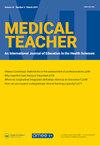人工智能和学术作者的死亡。
IF 3.3
2区 教育学
Q1 EDUCATION, SCIENTIFIC DISCIPLINES
引用次数: 0
摘要
在《作者之死》(The Death of The Author)一文中,罗兰•巴特(Roland Barthes)将小说作者描述为文化艺术品的混合体。本文确定了该活动与大型语言模型(llm)当前执行的操作之间的相似之处。然后进一步指出,在卫生专业教育学术界(实际上,所有学术界),作者身份是一个机械的角色,非常适合法学硕士,应该给予法学硕士,使学术研究人员能够专注于任何工作的实际创造性和贡献部分:研究。本文章由计算机程序翻译,如有差异,请以英文原文为准。
Artificial intelligence and the death of the academic author.
In his essay 'The Death of the Author,' Roland Barthes describes the fiction author as a blender of cultural artifacts. This paper identifies parallels between that activity and the actions currently performed by Large Language Models (LLMs). It then goes further to argue that, in Health Professions Education academia (indeed, all academia), authorship is a mechanical role ideally suited to LLMs, and should be given to LLMs, freeing academic researchers to focus on the actual creative and contributive portion of any work: the research.
求助全文
通过发布文献求助,成功后即可免费获取论文全文。
去求助
来源期刊

Medical Teacher
医学-卫生保健
CiteScore
7.80
自引率
8.50%
发文量
396
审稿时长
3-6 weeks
期刊介绍:
Medical Teacher provides accounts of new teaching methods, guidance on structuring courses and assessing achievement, and serves as a forum for communication between medical teachers and those involved in general education. In particular, the journal recognizes the problems teachers have in keeping up-to-date with the developments in educational methods that lead to more effective teaching and learning at a time when the content of the curriculum—from medical procedures to policy changes in health care provision—is also changing. The journal features reports of innovation and research in medical education, case studies, survey articles, practical guidelines, reviews of current literature and book reviews. All articles are peer reviewed.
 求助内容:
求助内容: 应助结果提醒方式:
应助结果提醒方式:


